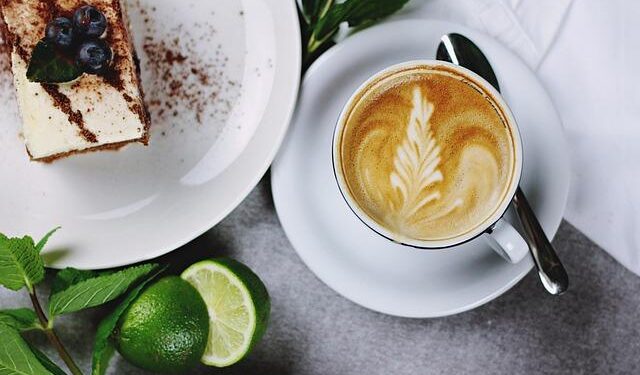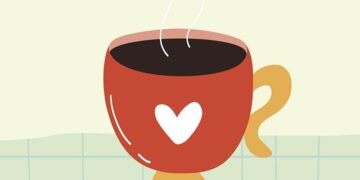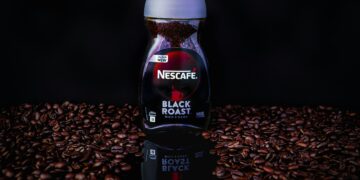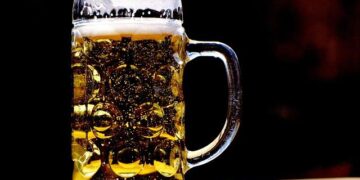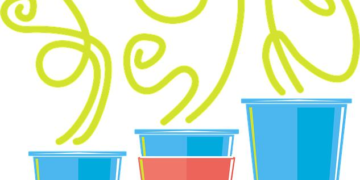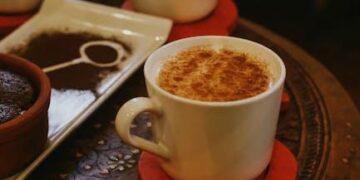Table of Contents
My Caffeine Wake-Up Call: The Jittery Journey That Sparked an Obsession
It was 2 P.M. on a Tuesday, and I had a career-defining presentation in less than an hour.
My energy was flagging, and I needed a precise, controlled boost—just enough to sharpen my focus without sending me over the edge.
I walked into a Starbucks with a simple plan: get two shots of espresso.
Scanning the menu, my eyes landed on a familiar name: the “Starbucks® Doubleshot on i.e.” Perfect, I thought.
The name said it all.
It had to be exactly what I needed—two shots, chilled.
I was wrong.
Disastrously wrong.
Twenty minutes later, as I stood up to speak, it began.
It wasn’t the gentle lift I’d anticipated.
It was a tidal wave.
My heart started hammering against my ribs, my palms grew slick with sweat, and a frantic, jittery energy coursed through me, making it impossible to stand still.1
My carefully prepared thoughts scattered like leaves in a hurricane.
I stumbled through the presentation, my mind racing a mile a minute while my words struggled to keep up.
The controlled confidence I needed had been replaced by a palpable, vibrating anxiety.3
I had not just failed to get the right tool for the job; I had actively sabotaged myself with a single, seemingly straightforward coffee order.
That experience left me with a burning question that went far beyond my ruined afternoon: Why was that “doubleshot” so much stronger than I expected? How much caffeine is really in these drinks, and why is it so hard to find a straight answer? My journey down the rabbit hole began, and what I discovered was a landscape of confusing branding, counter-intuitive science, and hidden variables that make navigating the Starbucks menu a minefield for even the most health-conscious consumer.
It became clear that the core problem wasn’t just the caffeine itself, but the profound ambiguity surrounding it.
The name on the cup, I learned, often has very little to do with the actual ingredients inside.4
This report is the map I created to navigate that minefield—a definitive guide to understanding, controlling, and mastering your caffeine intake at Starbucks, starting with the most deceptive term of all: the “Doubleshot.”
The “Doubleshot” Deception: Cracking the Code on Starbucks’ Most Confusing Term
The source of my afternoon disaster, and the first great mystery to solve, was the word “Doubleshot.” To most people, it implies two of something—specifically, two shots of espresso.
Yet, at Starbucks, this term is a brand name applied to a family of four distinct products, each with a wildly different caffeine payload.
Understanding the difference is the first and most critical step toward empowered ordering.
The term “Doubleshot” is not a literal description of ingredients for most of the products that bear its name; it is a marketing concept.
It is used to sell the idea of a quick, potent coffee boost.
This is a crucial distinction because it means the consumer cannot rely on intuition or the name of the drink to gauge its contents.
One must learn the specific recipe behind each name.
Here is a clear breakdown of what you are actually getting when you see the word “Doubleshot” at Starbucks:
- The Barista’s Double Shot (A “Doppio”): This is the most literal interpretation and the baseline for our investigation. When you walk up to the counter and ask for “two shots of espresso” or a “doppio,” you receive approximately two fluid ounces of espresso. Using Starbucks’ standard Signature Espresso Roast, this drink contains approximately 150 milligrams of caffeine (75 mg per shot).4 This is the simple, straightforward order.
- The Hidden Powerhouse (The Starbucks® Doubleshot on Ice): This was the culprit behind my jittery fiasco. Despite its name, a Grande (16 fl oz) does not contain two shots of espresso; it contains three. These three shots are shaken with ice, classic syrup, and a splash of 2% milk. The result is a drink with a staggering 225 milligrams of caffeine.4 This is 50% more caffeine than a standard doppio and well over half the daily recommended limit for many adults.
- The Convenience Store Cans: The “Doubleshot” brand extends to the refrigerated section of grocery and convenience stores, further muddying the waters.
- Starbucks® Doubleshot Energy: This is a larger, 15 fl oz canned beverage that blends coffee with B vitamins, guarana, and ginseng, positioning it as a coffee-energy drink hybrid. It contains 135 milligrams of caffeine.4
- Starbucks® Doubleshot Espresso + Cream: This is the smaller, more concentrated 6.5 fl oz can of sweetened espresso and cream. It contains 120 milligrams of caffeine.4
The disparity is stark.
Depending on which “Doubleshot” you choose, you could be consuming anywhere from 120 mg to 225 mg of caffeine.
The table below provides an at-a-glance comparison to eliminate this dangerous ambiguity once and for all.
Table 1: The “Doubleshot” Showdown
| Product Name | Type | Serving Size | Caffeine (mg) | What It Actually Is |
| Espresso (Doppio) | In-Store Order | ~2 fl oz | ~150 mg | Two shots of Signature Espresso.4 |
| Starbucks® Doubleshot on Ice | In-Store Order | 16 fl oz (Grande) | 225 mg | Three shots of Signature Espresso, shaken with ice, syrup, and milk.4 |
| Starbucks® Doubleshot Energy | Canned Drink | 15 fl oz | 135 mg | Canned coffee and energy drink hybrid with added stimulants like guarana.4 |
| Starbucks® Doubleshot Espresso + Cream | Canned Drink | 6.5 fl oz | 120 mg | Canned sweetened espresso and cream beverage.4 |
The Anatomy of a Shot: Why Not All Espressos Are Created Equal
After demystifying the “Doubleshot” branding, I realized I needed to go deeper.
The shot of espresso is the fundamental building block of dozens of drinks on the menu.
To truly understand my caffeine intake, I had to understand the shot itself.
This led to my biggest epiphany, a simple analogy that changed everything about how I look at a coffee menu.
Asking “how much caffeine is in a coffee?” is like asking “how much alcohol is in a drink?” The question is meaningless without more information.
A 12 oz can of light beer, a 5 oz glass of wine, and a 1.5 oz shot of whiskey all constitute one “standard drink,” but they achieve this through a balance of concentration (the “proof” or alcohol by volume) and total volume.7
Caffeine works the same Way. Espresso is like whiskey: it has a very high concentration of caffeine per ounce, but it’s served in a very small volume.
Drip coffee is like beer: it has a lower concentration of caffeine per ounce, but it’s served in a much larger volume.
This is why a small shot of espresso can feel “stronger” in flavor but may actually contain less total caffeine than a large mug of drip coffee.
A Venti latte, therefore, contains a high total amount of caffeine not because the milk adds caffeine (it doesn’t), but because it’s a large beverage built on a significant volume of the “hard liquor”—multiple espresso shots.
Once I had this framework, I could analyze the shot itself.
I learned that several factors, all deliberately chosen by Starbucks, determine the caffeine content of that foundational ingredient.
Roast Profile: The Blonde vs. Signature Myth
One of the most common misconceptions in the coffee world is that a darker, bolder-tasting roast contains more caffeine.
The reality is the exact opposite.
The roasting process, which exposes beans to high heat, burns off a tiny amount of caffeine along with water and other compounds.8
Therefore, a lighter roast retains slightly more of its original caffeine content.
- Starbucks Signature Espresso: This is the standard, dark-roasted espresso used in most drinks. A single shot contains approximately 75 milligrams of caffeine.5
- Starbucks Blonde Espresso: This is a lighter-roasted option with a smoother, sweeter flavor profile. A single shot of Blonde Espresso contains approximately 85 milligrams of caffeine.5
This 10 mg difference per shot is a crucial variable.
Choosing Blonde over Signature in a three-shot drink adds an extra 30 mg of caffeine—the equivalent of a can of cola—without changing the drink’s size or name.
The “strong” flavor of the Signature dark roast comes from the chemical changes during a longer roast, not from a higher caffeine kick.11
The Decaf Reality: Not Quite Zero
For those who are highly sensitive to caffeine or need to avoid it for medical reasons, it’s critical to know that “decaf” does not mean “caffeine-free.” The decaffeination process, whether it’s a water-based or solvent-based method, is designed to remove at least 97% of the caffeine, a standard set by the U.S. Food and Drug Administration.12
This means a small, residual amount remains.
A decaffeinated Starbucks espresso shot typically contains between 3 and 15 milligrams of caffeine.13
While this is a tiny fraction of a regular shot, it is not zero.
For most people, this amount is negligible.
However, for someone with a severe sensitivity, heart condition, or who is pregnant, this small amount could be significant, and multiple decaf drinks could add up over a day.15
Bean Choice: The Arabica Foundation
The final piece of the puzzle lies in the coffee bean itself.
There are two primary species of coffee grown commercially: Arabica and Robusta.
Starbucks has built its brand on using 100% Arabica beans for all its coffee, including its espresso.17
This is a pivotal decision that fundamentally shapes their caffeine profile.
- Arabica beans, grown at high altitudes, are known for their complex, aromatic, and less bitter flavor. They have a lower caffeine content, typically around 1.2% to 1.5% caffeine by weight.19
- Robusta beans are hardier, easier to grow, and have a bolder, more “classic” coffee flavor. Critically, they contain almost double the caffeine of Arabica beans, averaging 2.2% to 2.7% by weight.20
By committing to 100% Arabica, Starbucks made a strategic choice.
They prioritized the smoother, more nuanced flavor profile associated with high-quality coffee, which aligns with their premium brand image.
This choice inherently puts a lower ceiling on the caffeine content of their raw ingredient compared to competitors who might use Robusta blends to deliver a cheaper and more potent jolt.
However, this does not mean their drinks are low in caffeine.
They compensate for the lower-potency bean by manipulating the quantity of shots in their standard recipes.
A Grande or Venti drink often contains two, three, or even four shots of this Arabica espresso.10
This strategy allows Starbucks to maintain its “quality flavor” marketing message while still delivering the significant caffeine payload that the mass market has come to expect.
The introduction of the higher-caffeine Blonde Roast was another move in this direction, offering a more potent option without abandoning their core commitment to the Arabica bean.
It’s a carefully calibrated system that balances brand perception with the practical demands of a caffeine-driven consumer base.
Your Daily Caffeine Budget: Putting Starbucks Drinks in Perspective
Understanding the caffeine in a single shot is one thing; managing your total daily intake is another.
To make truly informed decisions, you need to place your Starbucks order within the broader context of health guidelines.
According to the U.S. Food and Drug Administration (FDA) and other health organizations like the Mayo Clinic, up to 400 milligrams of caffeine per day is considered a safe amount for most healthy adults.16
This isn’t a rigid rule, as individual sensitivity, body weight, and health conditions can play a significant role, but it serves as an excellent “daily budget”.15
Consuming more than this amount can lead to the very symptoms I experienced during my “Doubleshot” incident: anxiety, jitteriness, rapid heartbeat, digestive issues, and insomnia.2
It’s easy to see how a routine coffee habit can push you over this limit without you even realizing it.
- A single Grande Latte (with two Signature shots, 150 mg) uses up 38% of your daily budget.
- A Grande Starbucks® Doubleshot on Ice (with three Signature shots, 225 mg) consumes 56% of your budget.
- A Venti Blonde Roast Brewed Coffee (not espresso) contains a massive 475 mg, exceeding your entire daily budget in one cup.
The following table is designed to be your ultimate cheat sheet.
It breaks down the caffeine content for the most popular espresso-based drinks at Starbucks, allowing you to see exactly how much of your daily budget you’re spending with each order.
Note that for iced espresso drinks, a Venti size typically gets an extra shot compared to its hot counterpart.
Table 2: Your Starbucks Caffeine Calculator
| Drink Name | Size | # of Shots (Hot) | # of Shots (Iced) | Caffeine (Signature) | Caffeine (Blonde) |
| Espresso | Solo | 1 | 1 | ~75 mg | ~85 mg |
| Doppio | 2 | 2 | ~150 mg | ~170 mg | |
| Caffè Americano | Tall (12oz) | 2 | 2 | ~150 mg | ~170 mg |
| Grande (16oz) | 3 | 3 | ~225 mg | ~255 mg | |
| Venti (20oz) | 4 | 4 | ~300 mg | ~340 mg | |
| Caffè Latte / Cappuccino | Tall (12oz) | 1 | 1 | ~75 mg | ~85 mg |
| Grande (16oz) | 2 | 2 | ~150 mg | ~170 mg | |
| Venti (20oz) | 2 | 3 | ~150 mg | ~255 mg | |
| Caramel Macchiato | Tall (12oz) | 1 | 1 | ~75 mg | ~85 mg |
| Grande (16oz) | 2 | 2 | ~150 mg | ~170 mg | |
| Venti (20oz) | 2 | 3 | ~150 mg | ~255 mg | |
| Flat White | Tall (12oz) | 2 (Ristretto) | N/A | ~130 mg* | ~150 mg* |
| Grande (16oz) | 3 (Ristretto) | N/A | ~195 mg* | ~225 mg* | |
| Venti (20oz) | 4 (Ristretto) | N/A | ~260 mg* | ~300 mg* | |
| Iced Shaken Espresso | Tall (12oz) | N/A | 2 | ~150 mg | ~170 mg |
| Grande (16oz) | N/A | 3 | ~225 mg | ~255 mg | |
| Venti (20oz) | N/A | 4 | ~300 mg | ~340 mg |
Note: Ristretto shots, used in Flat Whites, use the same amount of coffee but less water, resulting in a slightly lower caffeine content per shot compared to a standard espresso shot.
The values are estimated based on this principle.
To make these numbers even more tangible, it helps to compare them to other common caffeinated products.
This can help you better gauge your total intake throughout the day.
Table 3: Caffeine Equivalency Chart
| Starbucks Drink (Grande, Signature) | Caffeine (mg) | Equivalent To Approximately… |
| Caffè Latte | ~150 mg | 1.5 eight-ounce cups of brewed coffee 24, 3 cans of Diet Coke 25, or 1.75 Red Bull energy drinks.25 |
| Caffè Americano | ~225 mg | 2.4 eight-ounce cups of brewed coffee 24, 5 cans of Diet Coke 25, or a 2-ounce energy shot.23 |
| Iced Green Tea | ~25 mg | Half a cup of black tea 23 or about 1 ounce of dark chocolate.24 |
The Empowered Order: A Strategic Guide to Mastering the Starbucks Menu
Armed with an understanding of the components, the health context, and the misleading branding, I finally felt equipped to take back control.
I learned that the Starbucks menu isn’t a fixed list of choices but a modular system.
The drinks are all built from a few core components: espresso, milk, water, ice, and syrup.
An empowered customer doesn’t just pick a name from the menu; they assemble these components to create a drink that perfectly matches their needs for caffeine, calories, and cost.
This is the system I developed to order with precision and confidence every single time.
For the Low-Caffeine Seeker: How to Get Less Buzz
If you’re sensitive to caffeine, need an afternoon drink that won’t disrupt your sleep, or are simply trying to reduce your overall intake, these strategies are your best friends.
- Master the “Half-Caf” Command: This is the easiest and most effective trick. You can order any espresso-based beverage “half-decaf.” The baristas have a dedicated button on their machines that pulls a shot using half regular beans and half decaf beans, making it a seamless request.14 A Grande half-caf latte would contain roughly
85 mg of caffeine instead of 150 mg, giving you the flavor and ritual with about half the kick. - Manipulate the Shot-to-Milk Ratio: If you enjoy the volume and experience of a larger drink but want the caffeine of a smaller one, simply change the cup size. Order “a single tall latte in a grande cup.” You’ll receive a drink with the caffeine of a Tall (one shot, ~75−85 mg) but the size of a Grande, with the extra space filled with steamed milk.14 This gives you more to sip on without adding more stimulant.
- Explore the Tea and Crème Menus: Don’t forget the non-coffee options. A Grande Iced Green Tea contains only 25 mg of caffeine, and an Iced White Tea even less.27 Herbal teas like Passion Tango, Mint Majesty, and Peach Tranquility are completely caffeine-free.28 On the sweeter side, any “Crème” Frappuccino (like the Vanilla Bean or Strawberry Crème) is made with a caffeine-free base. Similarly, a “Steamer” (like a Vanilla Crème) is just steamed milk and syrup, with zero caffeine.28
- A Note on Chocolate: Be aware that regular mocha sauce and chocolate inclusions contain caffeine from cocoa. The White Chocolate Mocha sauce, however, is caffeine-free. A Grande White Hot Chocolate has 0 mg of caffeine, while a regular Hot Chocolate has about 25 mg.13
For the Maximum-Buzz Hunter: How to Get More Kick
If your goal is to get the most caffeine for your money and your tolerance allows it, these strategies will help you maximize your intake efficiently.
- Always Go Blonde: As established, Blonde Espresso contains about 10 mg more caffeine per shot than Signature Espresso.8 Making this simple switch is the easiest way to boost the potency of any espresso drink. A Venti iced latte with three Blonde shots will have ~
255 mg of caffeine, compared to ~225 mg with Signature. - Leverage the Power Players: For a standard in-store order, the Iced Shaken Espresso (or its predecessor, the Doubleshot on Ice) and Cold Brew are your strongest options. A Grande Iced Shaken Espresso contains three shots (225 mg), and a Grande Cold Brew contains around 205 mg.6 These drinks are inherently designed for a higher caffeine payload.
- The Americano Advantage: An Americano is one of the most efficient ways to get caffeine. Because it’s just espresso and water, it’s cheaper than a latte. Furthermore, Starbucks’ standard recipes give Americanos an extra shot compared to lattes of the same size. A Grande Americano has three shots (225 mg), while a Grande Latte has only two (150 mg).26 If you want a milky drink, you can order an Americano and ask for extra steamed milk, essentially creating a cheaper, more caffeinated latte.
Conclusion: From Caffeinated Chaos to Conscious Consumption
My journey began with a single, disastrous coffee order—a moment of confusion that led to anxiety and frustration.
It forced me to confront the reality that navigating the modern coffee landscape requires more than just a passing glance at a menu.
It demands a deeper understanding of the product itself.
The investigation that followed, from deconstructing the “Doubleshot” myth to understanding the anatomy of an espresso shot, was a revelation.
The central discovery is that the power to control your caffeine intake has been there all along, hidden behind a veil of ambiguous branding and popular misconceptions.
The key is to shift your thinking.
Stop ordering a name and start ordering components.
By understanding the simple variables—roast type (Blonde vs. Signature), number of shots, and the difference between concentration and volume—you transform from a passive consumer into the architect of your own beverage.
You now know that a “Doubleshot” can mean four different things.
You know that the lighter, smoother Blonde roast packs more of a punch than its dark, bold counterpart.
You understand that asking for “a single shot in a grande cup” is a powerful tool for moderation, just as ordering an “Americano with a splash of milk” is an efficient hack for maximization.
You are equipped with the knowledge that the 400 mg daily guideline is your budget, and you have the tools to track your spending with every sip.
The mystery is solved.
The chaos has been replaced by clarity.
The power to create a coffee ritual that perfectly serves your health, your energy needs, and your peace of mind is now, officially, in your hands.
Works cited
- Feeling the coffee rush? How to get rid of coffee jitters – Baylor Scott & White Health, accessed August 4, 2025, https://www.bswhealth.com/blog/coffee-jitters-grab-a-banana
- Caffeine’s Side Effects | Aurora Health Care, accessed August 4, 2025, https://www.aurorahealthcare.org/services/gastroenterology-colorectal-surgery/caffeine-side-effects
- 9 Side Effects of Too Much Caffeine – Healthline, accessed August 4, 2025, https://www.healthline.com/nutrition/caffeine-side-effects
- How Much Caffeine Is in a Starbucks Doubleshot Energy Drink …, accessed August 4, 2025, https://cornercoffeestore.com/how-much-caffeine-in-starbucks-doubleshot/
- What is the caffeine content of straight espresso shots? : r/starbucks – Reddit, accessed August 4, 2025, https://www.reddit.com/r/starbucks/comments/1k9lhci/what_is_the_caffeine_content_of_straight_espresso/
- Caffè Americano: Nutrition: Starbucks Coffee Company, accessed August 4, 2025, https://www.starbucks.com/menu/product/406/hot/nutrition
- How much caffeine, once and for all? : r/Coffee – Reddit, accessed August 4, 2025, https://www.reddit.com/r/Coffee/comments/4rptcf/how_much_caffeine_once_and_for_all/
- Is blonde espresso really stronger than normal espresso?, accessed August 4, 2025, https://cliffandpebble.com/blogs/our-blog/is-blonde-espresso-really-stronger-than-normal-espresso
- Blonde Espresso vs Regular: Understand The Differences – Twisted Goat Coffee, accessed August 4, 2025, https://twistedgoatcoffee.com/blogs/espresso/blonde-espresso-vs-regular
- Starbucks Caffeine Content Guide: Brand Comparison & Levels – Barista Life, accessed August 4, 2025, https://baristalife.co/blogs/blog/starbucks-caffeine-content
- Busting Common Coffee Myths: The Truth Behind Your Favorite …, accessed August 4, 2025, https://www.nashhousesaloon.com/posts/busting-common-coffee-myths-the-truth-behind-your-favorite-brew
- What is Decaffeinated Coffee? | Starbucks® Coffee at Home, accessed August 4, 2025, https://athome.starbucks.com/learn/what-is-decaffeinated-coffee
- The ULTIMATE Guide To Caffeine-Free Drinks at Starbucks | Lifeboost Coffee, accessed August 4, 2025, https://lifeboostcoffee.com/blogs/lifeboost/the-ultimate-guide-to-caffeine-free-drinks-at-starbucks
- How do I get a coffee with less caffeine? : r/starbucks – Reddit, accessed August 4, 2025, https://www.reddit.com/r/starbucks/comments/137yjtr/how_do_i_get_a_coffee_with_less_caffeine/
- How much caffeine is too much? | MD Anderson Cancer Center, accessed August 4, 2025, https://www.mdanderson.org/cancerwise/how-much-caffeine-is-too-much.h00-159776445.html
- Caffeine: How much is too much? – Mayo Clinic, accessed August 4, 2025, https://www.mayoclinic.org/healthy-lifestyle/nutrition-and-healthy-eating/in-depth/caffeine/art-20045678
- Arabica vs Robusta Coffee Beans | Starbucks® Coffee at Home, accessed August 4, 2025, https://athome.starbucks.com/learn/arabica-coffee-vs-robusta-coffee-beans
- What Coffee Beans Does Starbucks Use? – DHK International, accessed August 4, 2025, https://www.dhkusa.com/blogs/what-coffee-beans-does-starbucks-use
- Arabica Coffee Beans – Arabica vs Robusta | Starbucks®️ at Home, accessed August 4, 2025, https://www.starbucksathome.com/my/story/why-arabica-coffee
- Why you should Drink Robusta Coffee Beans, accessed August 4, 2025, https://stonestreetcoffee.com/blogs/brooklyn-coffee-academy/robusta-is-the-most-caffeinated-coffee-bean-type-and-if-you-re-not-drinking-it-you-re-missing-out
- stonestreetcoffee.com, accessed August 4, 2025, https://stonestreetcoffee.com/blogs/brooklyn-coffee-academy/robusta-is-the-most-caffeinated-coffee-bean-type-and-if-you-re-not-drinking-it-you-re-missing-out#:~:text=Arabica%2C%20the%20most%20popular%20coffee,and%20more%20naturally%20bitter%20flavor.
- www.fda.gov, accessed August 4, 2025, https://www.fda.gov/consumers/consumer-updates/spilling-beans-how-much-caffeine-too-much
- Caffeine content for coffee, tea, soda and more – Mayo Clinic, accessed August 4, 2025, https://www.mayoclinic.org/healthy-lifestyle/nutrition-and-healthy-eating/in-depth/caffeine/art-20049372
- Caffeine • The Nutrition Source, accessed August 4, 2025, https://nutritionsource.hsph.harvard.edu/caffeine/
- How Much Caffeine in Drinks — Coffee, Tea, Soft Drinks — Caffeine …, accessed August 4, 2025, https://www.math.utah.edu/~yplee/fun/caffeine.html
- 6 Starbucks Cheap Drink Hacks – Peg Theobald, accessed August 4, 2025, https://pegtheobald.com/2018/11/28/6-starbucks-cheap-drink-hacks/
- 10 Low Caffeine Starbucks Drinks – Ashley Burk, accessed August 4, 2025, https://ashleyburk.com/low-caffeine-starbucks-drinks/
- 15 Caffeine-Free (And Low Caffeine) Starbucks Drinks, Ranked – Chowhound, accessed August 4, 2025, https://www.chowhound.com/1718533/caffeine-free-starbucks-drinks-list/
- Cold Brew: Nutrition: Starbucks Coffee Company, accessed August 4, 2025, https://www.starbucks.com/menu/product/2121255/iced/nutrition
